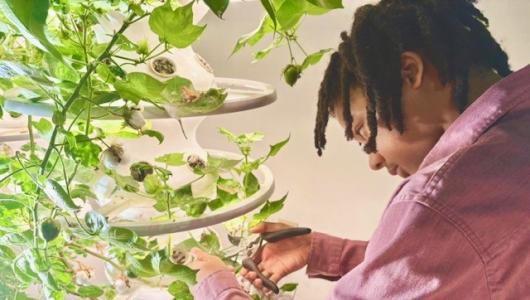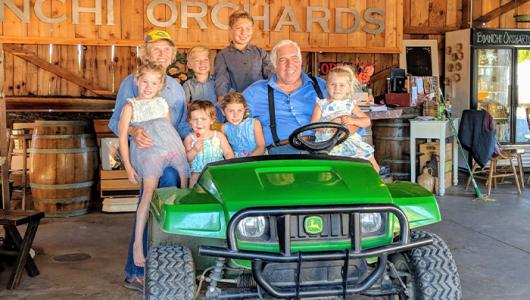USDA is opening new Urban Service Centers in 17 cities throughout the country. This is part of USDA’s broad investment in urban agriculture and innovative production. Urban farms generally include community farms and gardens, rooftop, indoor, and vertical farms, and hydroponic, aeroponic, and aquaponic facilities. Urban crop and livestock production play an essential role in a resilient food system, and provide healthy local food, encourage economic development, provide employment and on-the-job training, expand community greenspaces, foster community collaboration, and help build disaster resilient communities.
Like our other 2,300 Service Centers, located in nearly every county in the country, the new Urban Service Centers are where you can meet face-to-face with Farm Service Agency (FSA) and Natural Resources Conservation Service (NRCS) staff to discuss your vision and goals and learn ways we can help support you through programs and services including farm loans, conservation, disaster assistance, and risk management.
We talked to Stefen Tucker, FSA’s urban county executive director at the Dallas Urban Service Center, and Freddie Patiño Rodriguez, the urban district conservationist in Philadelphia, to get their insights as Urban Service Center staff. Stefen has worked for FSA for five years now and grew up on a family farm before moving to the Dallas/Fort Worth area. Freddie grew up on a family farm in Puerto Rico and has worked for NRCS for more than 10 years.

1. What do you want urban and innovative producers to know about Urban Service Centers?
Stefen, FSA: Many Urban Service Centers are already fully open and ready to help producers. We provide assistance based on each grower’s individual needs and goals, and there is no cost for our services. We love to learn about everyone’s operations and see how we can help. To make the most out of your visit, we recommend making an appointment. If you know your overall farming goals, we can prepare in advance and make the most of your time.
Freddie, NRCS: There are many services available at USDA Service Centers, such as technical assistance, guidance, financial assistance, grants and programs. You can learn more on our website. And, if an urban producer doesn’t live near one of the new Urban Service Centers, they can reach local staff at one of our Service Centers across the country. Find your nearest office by using the online Service Center locator, which provides the address and contact information for your local Service Center.
2. For the first visit, what should a producer bring to the Service Center?
Freddie, NRCS: For the first visit, a producer should provide their name and the address of the farm/garden location for which they are seeking assistance. At the Philadelphia Service Center, NRCS and FSA will plan the first visit together, guiding new customers to a better understanding of what each agency offers. In-person visits make it easier to explain and help customers complete forms. Some considerations before your visit:
- What is your vision for your garden or farm?
- What are your challenges?
We can help you think through your answers and recommend programs and services to meet your needs.
Stefen, FSA: What you need to bring to your appointment depends on your goals. I recommend calling your local Service Center prior to your appointment to see what documents and information you will need to provide. Requested information could range from your identification to documentation if you are completing a program or farm loan application. Checking before your appointment will help prevent the need for follow-ups and ensure an excellent customer experience.
3. What can a producer expect during their visit?
Stefen, FSA: Each Service Center is focused on the unique needs of their local customers. We stand behind the word “service” as our middle name, so we’ll sit down with you to get to know you and your operation. From here, we can help you establish a customer and farm record, complete eligibility documents and sign up for any programs applicable to your operation.
Freddie, NRCS: We seek to understand the needs of our customers so we can help find the right way to help you and provide great customer service. We tailor our assistance based on your individual goals. At the end of the meeting, you should have answers to all of your questions.
4. What does FSA do and how can they help?
Stefen, FSA: FSA is often the first USDA agency farmers come in contact with. We can help you establish a customer and farm record. You’ll need these to apply for FSA farm loans, disaster assistance, and risk management as well as NRCS conservation programs.
FSA offers many types of loans, including microloans tailored specifically to small-scale farms. FSA helps producers invest in, improve, expand, and protect their operations. FSA also helps producers recover from natural disasters and market fluctuations. Additionally, we currently handle the eligibility components for other agencies such as NRCS.
5. What does NRCS do and what are the most common practices used?
Freddie, NRCS: NRCS provides technical assistance, guidance and financial assistance based on specific needs and concerns of each customer. The most common practices in urban areas include high tunnels, raised beds, roofs and gutters, rain harvest barrels, drip irrigation, cover crops, composting facilities, and pollinator habitat. Your local district conservationist can help you identify which programs and practices are available in your area and that best meet your needs. The Peoples Garden is also a great opportunity for urban farmers who want to celebrate community gardening.
6. How can urban producers find more information?
Stefen, FSA: More information can be found at farmers.gov/urban and on our Urban Service Center website, which includes a video, brochure and worksheet. I encourage everyone to learn about their local service center in any county nationwide by visiting farmers.gov/service-locator. Producers interested in receiving the latest information and updates from their Urban Service Center can subscribe to our govDelivery email and text messaging service by visiting farmers.gov/subscribe and selecting the urban agriculture topic for their respective state and county.
Urban and innovative producers can learn more about available USDA programs by visiting our Urban Agriculture webpage on usda.gov. and downloading our “Urban Agriculture at a Glance” brochure.
Brandon O’Connor is a public affairs specialist with USDA’s Farm Production and Conservation Business Center. He can be reached at brandon.oconnor@usda.gov.


